Civil Liberties and Human Rights: UK Law Analysis Report - 2024
VerifiedAdded on 2022/10/17
|13
|3694
|9
Report
AI Summary
This report analyzes claims related to civil liberties and human rights, drawing on UK and European case law, the Human Rights Act 1998, and academic opinion. The report addresses three key claims: the extent of privacy rights under Article 8 of the European Convention on Human Rights and its impact on government policing; the challenge to parliamentary sovereignty posed by Sections 3 and 4 of the Human Rights Act 1998; and the 'living instrument' theory of the European Court of Human Rights and its creation of human rights beyond the original convention. The report also critically discusses the balance struck by UK courts between protecting individual liberties and state security in anti-terrorism cases, including the application of the Terrorism Act 2000 and the concept of deference. The analysis incorporates relevant case law, providing a comprehensive legal overview of these critical issues.
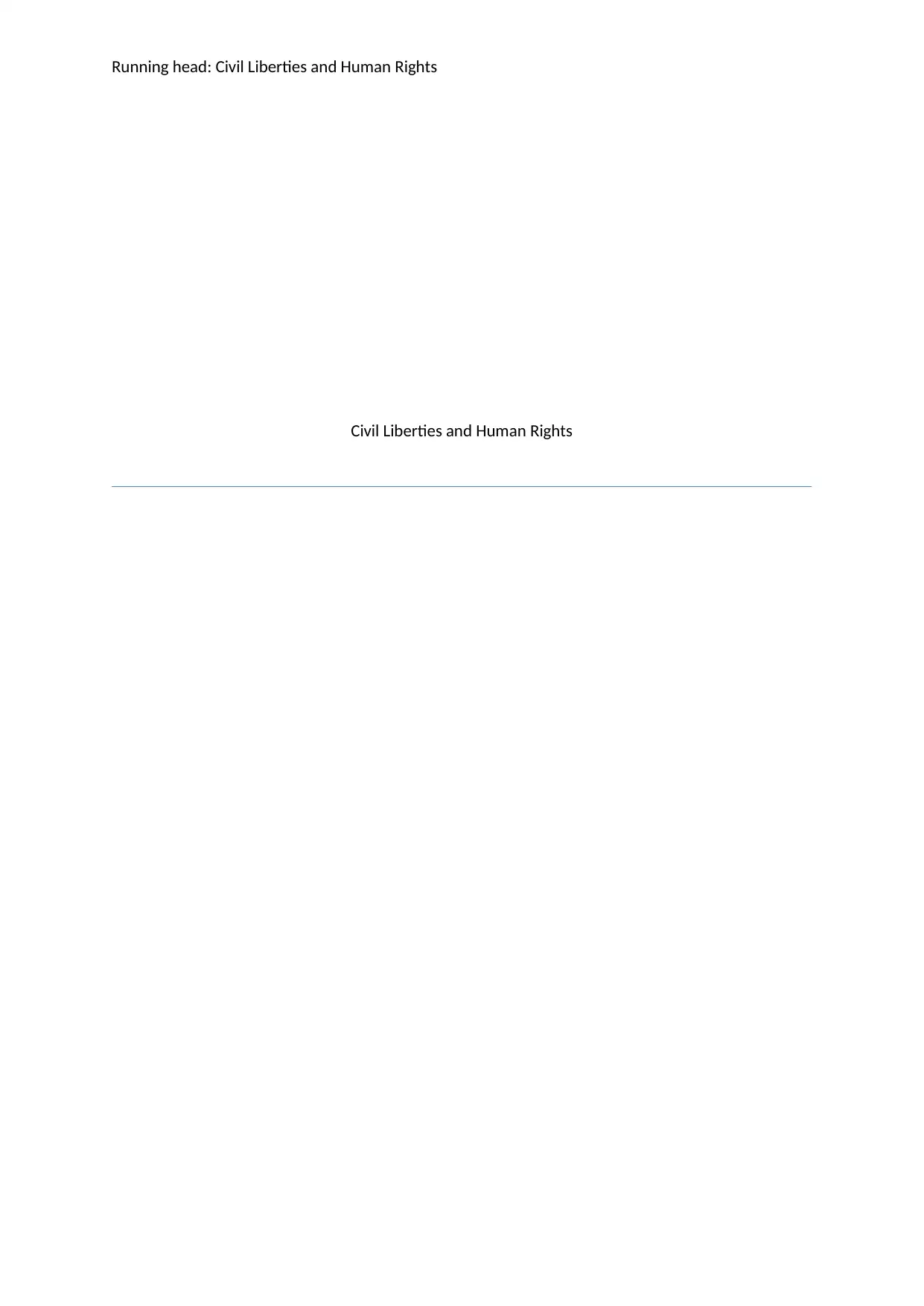
Running head: Civil Liberties and Human Rights
Civil Liberties and Human Rights
Civil Liberties and Human Rights
Paraphrase This Document
Need a fresh take? Get an instant paraphrase of this document with our AI Paraphraser
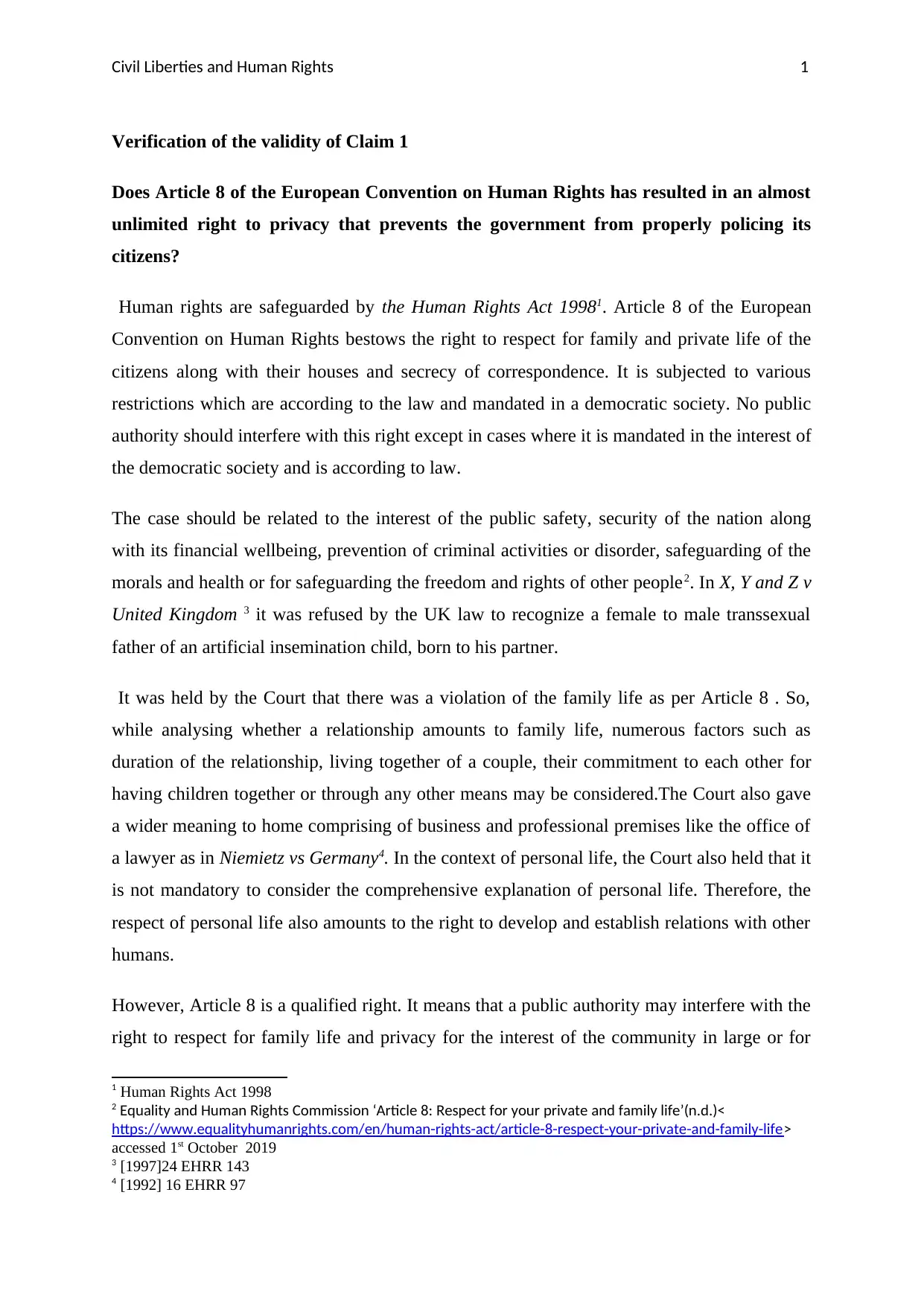
Civil Liberties and Human Rights 1
Verification of the validity of Claim 1
Does Article 8 of the European Convention on Human Rights has resulted in an almost
unlimited right to privacy that prevents the government from properly policing its
citizens?
Human rights are safeguarded by the Human Rights Act 19981. Article 8 of the European
Convention on Human Rights bestows the right to respect for family and private life of the
citizens along with their houses and secrecy of correspondence. It is subjected to various
restrictions which are according to the law and mandated in a democratic society. No public
authority should interfere with this right except in cases where it is mandated in the interest of
the democratic society and is according to law.
The case should be related to the interest of the public safety, security of the nation along
with its financial wellbeing, prevention of criminal activities or disorder, safeguarding of the
morals and health or for safeguarding the freedom and rights of other people2. In X, Y and Z v
United Kingdom 3 it was refused by the UK law to recognize a female to male transsexual
father of an artificial insemination child, born to his partner.
It was held by the Court that there was a violation of the family life as per Article 8 . So,
while analysing whether a relationship amounts to family life, numerous factors such as
duration of the relationship, living together of a couple, their commitment to each other for
having children together or through any other means may be considered.The Court also gave
a wider meaning to home comprising of business and professional premises like the office of
a lawyer as in Niemietz vs Germany4. In the context of personal life, the Court also held that it
is not mandatory to consider the comprehensive explanation of personal life. Therefore, the
respect of personal life also amounts to the right to develop and establish relations with other
humans.
However, Article 8 is a qualified right. It means that a public authority may interfere with the
right to respect for family life and privacy for the interest of the community in large or for
1 Human Rights Act 1998
2 Equality and Human Rights Commission ‘Article 8: Respect for your private and family life’(n.d.)<
https://www.equalityhumanrights.com/en/human-rights-act/article-8-respect-your-private-and-family-life>
accessed 1st October 2019
3 [1997]24 EHRR 143
4 [1992] 16 EHRR 97
Verification of the validity of Claim 1
Does Article 8 of the European Convention on Human Rights has resulted in an almost
unlimited right to privacy that prevents the government from properly policing its
citizens?
Human rights are safeguarded by the Human Rights Act 19981. Article 8 of the European
Convention on Human Rights bestows the right to respect for family and private life of the
citizens along with their houses and secrecy of correspondence. It is subjected to various
restrictions which are according to the law and mandated in a democratic society. No public
authority should interfere with this right except in cases where it is mandated in the interest of
the democratic society and is according to law.
The case should be related to the interest of the public safety, security of the nation along
with its financial wellbeing, prevention of criminal activities or disorder, safeguarding of the
morals and health or for safeguarding the freedom and rights of other people2. In X, Y and Z v
United Kingdom 3 it was refused by the UK law to recognize a female to male transsexual
father of an artificial insemination child, born to his partner.
It was held by the Court that there was a violation of the family life as per Article 8 . So,
while analysing whether a relationship amounts to family life, numerous factors such as
duration of the relationship, living together of a couple, their commitment to each other for
having children together or through any other means may be considered.The Court also gave
a wider meaning to home comprising of business and professional premises like the office of
a lawyer as in Niemietz vs Germany4. In the context of personal life, the Court also held that it
is not mandatory to consider the comprehensive explanation of personal life. Therefore, the
respect of personal life also amounts to the right to develop and establish relations with other
humans.
However, Article 8 is a qualified right. It means that a public authority may interfere with the
right to respect for family life and privacy for the interest of the community in large or for
1 Human Rights Act 1998
2 Equality and Human Rights Commission ‘Article 8: Respect for your private and family life’(n.d.)<
https://www.equalityhumanrights.com/en/human-rights-act/article-8-respect-your-private-and-family-life>
accessed 1st October 2019
3 [1997]24 EHRR 143
4 [1992] 16 EHRR 97
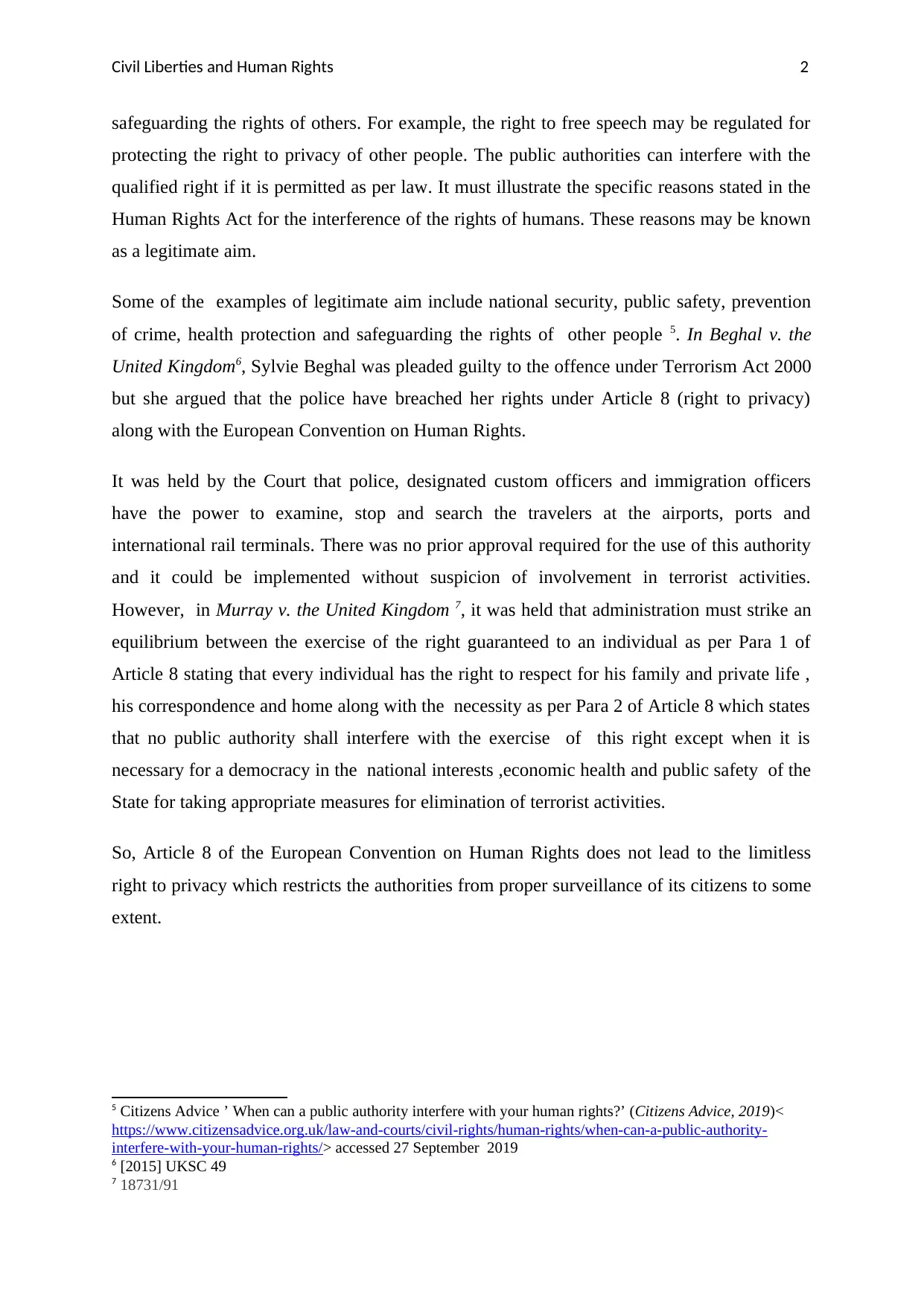
Civil Liberties and Human Rights 2
safeguarding the rights of others. For example, the right to free speech may be regulated for
protecting the right to privacy of other people. The public authorities can interfere with the
qualified right if it is permitted as per law. It must illustrate the specific reasons stated in the
Human Rights Act for the interference of the rights of humans. These reasons may be known
as a legitimate aim.
Some of the examples of legitimate aim include national security, public safety, prevention
of crime, health protection and safeguarding the rights of other people 5. In Beghal v. the
United Kingdom6, Sylvie Beghal was pleaded guilty to the offence under Terrorism Act 2000
but she argued that the police have breached her rights under Article 8 (right to privacy)
along with the European Convention on Human Rights.
It was held by the Court that police, designated custom officers and immigration officers
have the power to examine, stop and search the travelers at the airports, ports and
international rail terminals. There was no prior approval required for the use of this authority
and it could be implemented without suspicion of involvement in terrorist activities.
However, in Murray v. the United Kingdom 7, it was held that administration must strike an
equilibrium between the exercise of the right guaranteed to an individual as per Para 1 of
Article 8 stating that every individual has the right to respect for his family and private life ,
his correspondence and home along with the necessity as per Para 2 of Article 8 which states
that no public authority shall interfere with the exercise of this right except when it is
necessary for a democracy in the national interests ,economic health and public safety of the
State for taking appropriate measures for elimination of terrorist activities.
So, Article 8 of the European Convention on Human Rights does not lead to the limitless
right to privacy which restricts the authorities from proper surveillance of its citizens to some
extent.
5 Citizens Advice ’ When can a public authority interfere with your human rights?’ (Citizens Advice, 2019)<
https://www.citizensadvice.org.uk/law-and-courts/civil-rights/human-rights/when-can-a-public-authority-
interfere-with-your-human-rights/> accessed 27 September 2019
6 [2015] UKSC 49
7 18731/91
safeguarding the rights of others. For example, the right to free speech may be regulated for
protecting the right to privacy of other people. The public authorities can interfere with the
qualified right if it is permitted as per law. It must illustrate the specific reasons stated in the
Human Rights Act for the interference of the rights of humans. These reasons may be known
as a legitimate aim.
Some of the examples of legitimate aim include national security, public safety, prevention
of crime, health protection and safeguarding the rights of other people 5. In Beghal v. the
United Kingdom6, Sylvie Beghal was pleaded guilty to the offence under Terrorism Act 2000
but she argued that the police have breached her rights under Article 8 (right to privacy)
along with the European Convention on Human Rights.
It was held by the Court that police, designated custom officers and immigration officers
have the power to examine, stop and search the travelers at the airports, ports and
international rail terminals. There was no prior approval required for the use of this authority
and it could be implemented without suspicion of involvement in terrorist activities.
However, in Murray v. the United Kingdom 7, it was held that administration must strike an
equilibrium between the exercise of the right guaranteed to an individual as per Para 1 of
Article 8 stating that every individual has the right to respect for his family and private life ,
his correspondence and home along with the necessity as per Para 2 of Article 8 which states
that no public authority shall interfere with the exercise of this right except when it is
necessary for a democracy in the national interests ,economic health and public safety of the
State for taking appropriate measures for elimination of terrorist activities.
So, Article 8 of the European Convention on Human Rights does not lead to the limitless
right to privacy which restricts the authorities from proper surveillance of its citizens to some
extent.
5 Citizens Advice ’ When can a public authority interfere with your human rights?’ (Citizens Advice, 2019)<
https://www.citizensadvice.org.uk/law-and-courts/civil-rights/human-rights/when-can-a-public-authority-
interfere-with-your-human-rights/> accessed 27 September 2019
6 [2015] UKSC 49
7 18731/91
⊘ This is a preview!⊘
Do you want full access?
Subscribe today to unlock all pages.

Trusted by 1+ million students worldwide
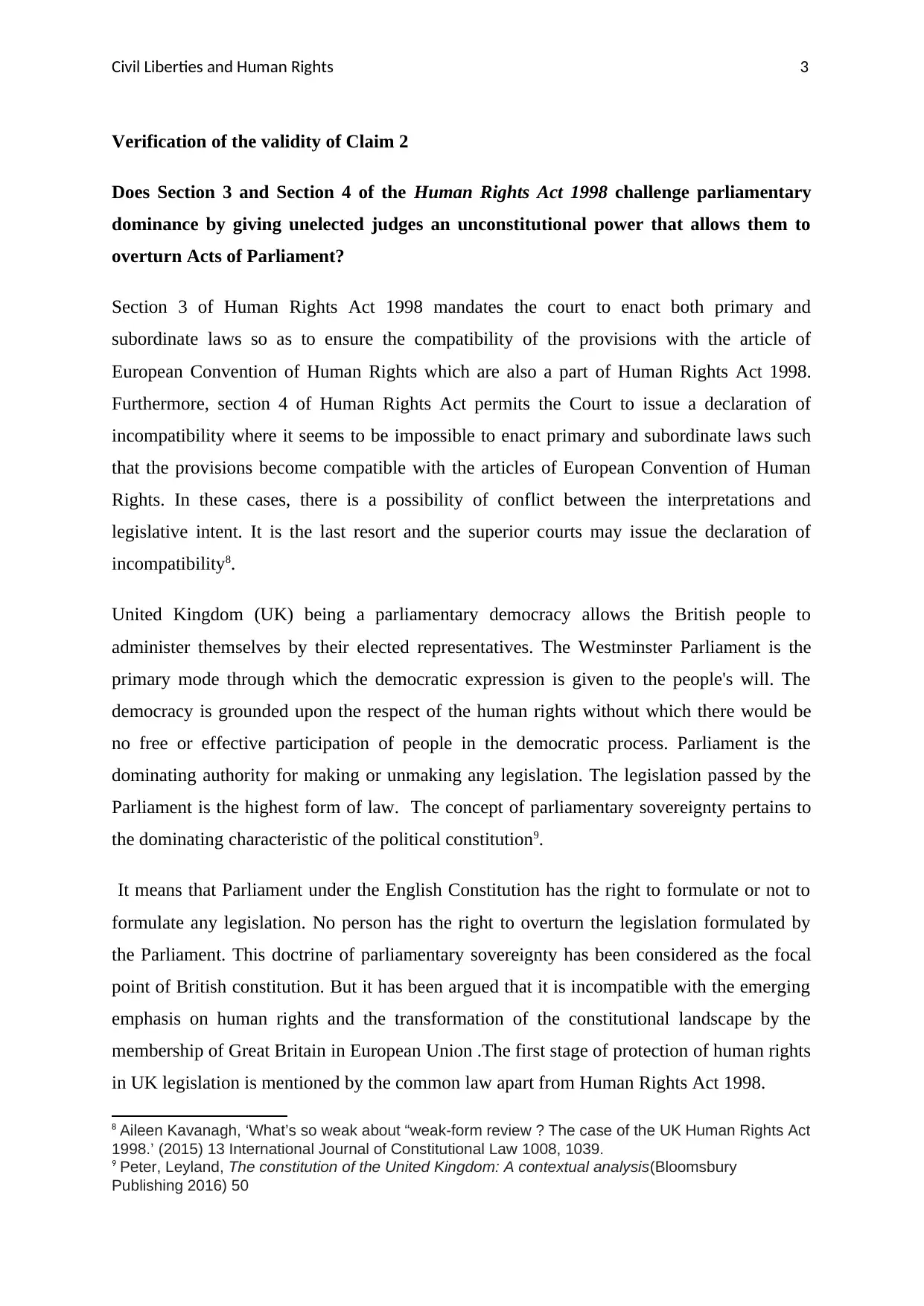
Civil Liberties and Human Rights 3
Verification of the validity of Claim 2
Does Section 3 and Section 4 of the Human Rights Act 1998 challenge parliamentary
dominance by giving unelected judges an unconstitutional power that allows them to
overturn Acts of Parliament?
Section 3 of Human Rights Act 1998 mandates the court to enact both primary and
subordinate laws so as to ensure the compatibility of the provisions with the article of
European Convention of Human Rights which are also a part of Human Rights Act 1998.
Furthermore, section 4 of Human Rights Act permits the Court to issue a declaration of
incompatibility where it seems to be impossible to enact primary and subordinate laws such
that the provisions become compatible with the articles of European Convention of Human
Rights. In these cases, there is a possibility of conflict between the interpretations and
legislative intent. It is the last resort and the superior courts may issue the declaration of
incompatibility8.
United Kingdom (UK) being a parliamentary democracy allows the British people to
administer themselves by their elected representatives. The Westminster Parliament is the
primary mode through which the democratic expression is given to the people's will. The
democracy is grounded upon the respect of the human rights without which there would be
no free or effective participation of people in the democratic process. Parliament is the
dominating authority for making or unmaking any legislation. The legislation passed by the
Parliament is the highest form of law. The concept of parliamentary sovereignty pertains to
the dominating characteristic of the political constitution9.
It means that Parliament under the English Constitution has the right to formulate or not to
formulate any legislation. No person has the right to overturn the legislation formulated by
the Parliament. This doctrine of parliamentary sovereignty has been considered as the focal
point of British constitution. But it has been argued that it is incompatible with the emerging
emphasis on human rights and the transformation of the constitutional landscape by the
membership of Great Britain in European Union .The first stage of protection of human rights
in UK legislation is mentioned by the common law apart from Human Rights Act 1998.
8 Aileen Kavanagh, ‘What’s so weak about “weak-form review ? The case of the UK Human Rights Act
1998.’ (2015) 13 International Journal of Constitutional Law 1008, 1039.
9 Peter, Leyland, The constitution of the United Kingdom: A contextual analysis(Bloomsbury
Publishing 2016) 50
Verification of the validity of Claim 2
Does Section 3 and Section 4 of the Human Rights Act 1998 challenge parliamentary
dominance by giving unelected judges an unconstitutional power that allows them to
overturn Acts of Parliament?
Section 3 of Human Rights Act 1998 mandates the court to enact both primary and
subordinate laws so as to ensure the compatibility of the provisions with the article of
European Convention of Human Rights which are also a part of Human Rights Act 1998.
Furthermore, section 4 of Human Rights Act permits the Court to issue a declaration of
incompatibility where it seems to be impossible to enact primary and subordinate laws such
that the provisions become compatible with the articles of European Convention of Human
Rights. In these cases, there is a possibility of conflict between the interpretations and
legislative intent. It is the last resort and the superior courts may issue the declaration of
incompatibility8.
United Kingdom (UK) being a parliamentary democracy allows the British people to
administer themselves by their elected representatives. The Westminster Parliament is the
primary mode through which the democratic expression is given to the people's will. The
democracy is grounded upon the respect of the human rights without which there would be
no free or effective participation of people in the democratic process. Parliament is the
dominating authority for making or unmaking any legislation. The legislation passed by the
Parliament is the highest form of law. The concept of parliamentary sovereignty pertains to
the dominating characteristic of the political constitution9.
It means that Parliament under the English Constitution has the right to formulate or not to
formulate any legislation. No person has the right to overturn the legislation formulated by
the Parliament. This doctrine of parliamentary sovereignty has been considered as the focal
point of British constitution. But it has been argued that it is incompatible with the emerging
emphasis on human rights and the transformation of the constitutional landscape by the
membership of Great Britain in European Union .The first stage of protection of human rights
in UK legislation is mentioned by the common law apart from Human Rights Act 1998.
8 Aileen Kavanagh, ‘What’s so weak about “weak-form review ? The case of the UK Human Rights Act
1998.’ (2015) 13 International Journal of Constitutional Law 1008, 1039.
9 Peter, Leyland, The constitution of the United Kingdom: A contextual analysis(Bloomsbury
Publishing 2016) 50
Paraphrase This Document
Need a fresh take? Get an instant paraphrase of this document with our AI Paraphraser
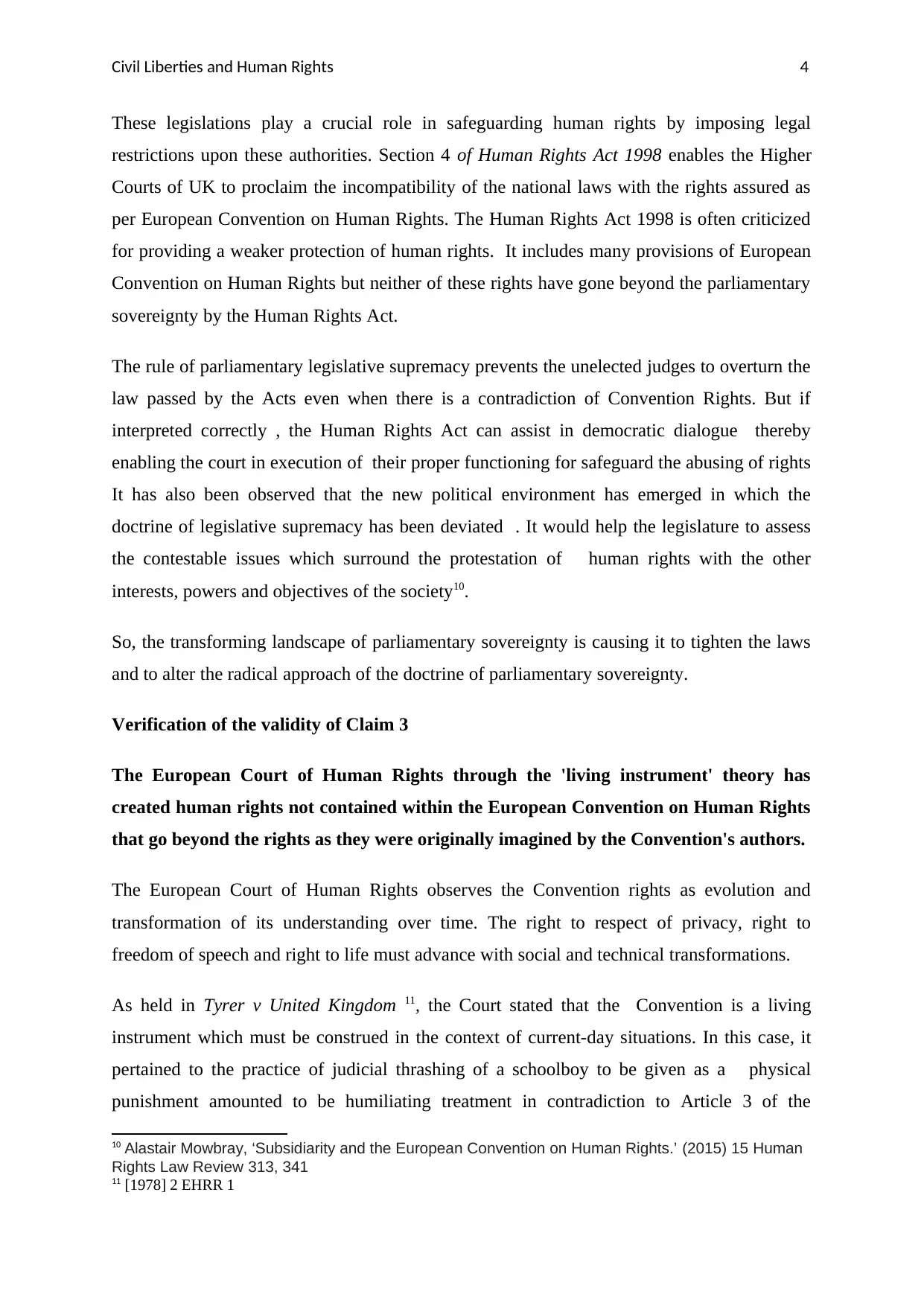
Civil Liberties and Human Rights 4
These legislations play a crucial role in safeguarding human rights by imposing legal
restrictions upon these authorities. Section 4 of Human Rights Act 1998 enables the Higher
Courts of UK to proclaim the incompatibility of the national laws with the rights assured as
per European Convention on Human Rights. The Human Rights Act 1998 is often criticized
for providing a weaker protection of human rights. It includes many provisions of European
Convention on Human Rights but neither of these rights have gone beyond the parliamentary
sovereignty by the Human Rights Act.
The rule of parliamentary legislative supremacy prevents the unelected judges to overturn the
law passed by the Acts even when there is a contradiction of Convention Rights. But if
interpreted correctly , the Human Rights Act can assist in democratic dialogue thereby
enabling the court in execution of their proper functioning for safeguard the abusing of rights
It has also been observed that the new political environment has emerged in which the
doctrine of legislative supremacy has been deviated . It would help the legislature to assess
the contestable issues which surround the protestation of human rights with the other
interests, powers and objectives of the society10.
So, the transforming landscape of parliamentary sovereignty is causing it to tighten the laws
and to alter the radical approach of the doctrine of parliamentary sovereignty.
Verification of the validity of Claim 3
The European Court of Human Rights through the 'living instrument' theory has
created human rights not contained within the European Convention on Human Rights
that go beyond the rights as they were originally imagined by the Convention's authors.
The European Court of Human Rights observes the Convention rights as evolution and
transformation of its understanding over time. The right to respect of privacy, right to
freedom of speech and right to life must advance with social and technical transformations.
As held in Tyrer v United Kingdom 11, the Court stated that the Convention is a living
instrument which must be construed in the context of current-day situations. In this case, it
pertained to the practice of judicial thrashing of a schoolboy to be given as a physical
punishment amounted to be humiliating treatment in contradiction to Article 3 of the
10 Alastair Mowbray, ‘Subsidiarity and the European Convention on Human Rights.’ (2015) 15 Human
Rights Law Review 313, 341
11 [1978] 2 EHRR 1
These legislations play a crucial role in safeguarding human rights by imposing legal
restrictions upon these authorities. Section 4 of Human Rights Act 1998 enables the Higher
Courts of UK to proclaim the incompatibility of the national laws with the rights assured as
per European Convention on Human Rights. The Human Rights Act 1998 is often criticized
for providing a weaker protection of human rights. It includes many provisions of European
Convention on Human Rights but neither of these rights have gone beyond the parliamentary
sovereignty by the Human Rights Act.
The rule of parliamentary legislative supremacy prevents the unelected judges to overturn the
law passed by the Acts even when there is a contradiction of Convention Rights. But if
interpreted correctly , the Human Rights Act can assist in democratic dialogue thereby
enabling the court in execution of their proper functioning for safeguard the abusing of rights
It has also been observed that the new political environment has emerged in which the
doctrine of legislative supremacy has been deviated . It would help the legislature to assess
the contestable issues which surround the protestation of human rights with the other
interests, powers and objectives of the society10.
So, the transforming landscape of parliamentary sovereignty is causing it to tighten the laws
and to alter the radical approach of the doctrine of parliamentary sovereignty.
Verification of the validity of Claim 3
The European Court of Human Rights through the 'living instrument' theory has
created human rights not contained within the European Convention on Human Rights
that go beyond the rights as they were originally imagined by the Convention's authors.
The European Court of Human Rights observes the Convention rights as evolution and
transformation of its understanding over time. The right to respect of privacy, right to
freedom of speech and right to life must advance with social and technical transformations.
As held in Tyrer v United Kingdom 11, the Court stated that the Convention is a living
instrument which must be construed in the context of current-day situations. In this case, it
pertained to the practice of judicial thrashing of a schoolboy to be given as a physical
punishment amounted to be humiliating treatment in contradiction to Article 3 of the
10 Alastair Mowbray, ‘Subsidiarity and the European Convention on Human Rights.’ (2015) 15 Human
Rights Law Review 313, 341
11 [1978] 2 EHRR 1
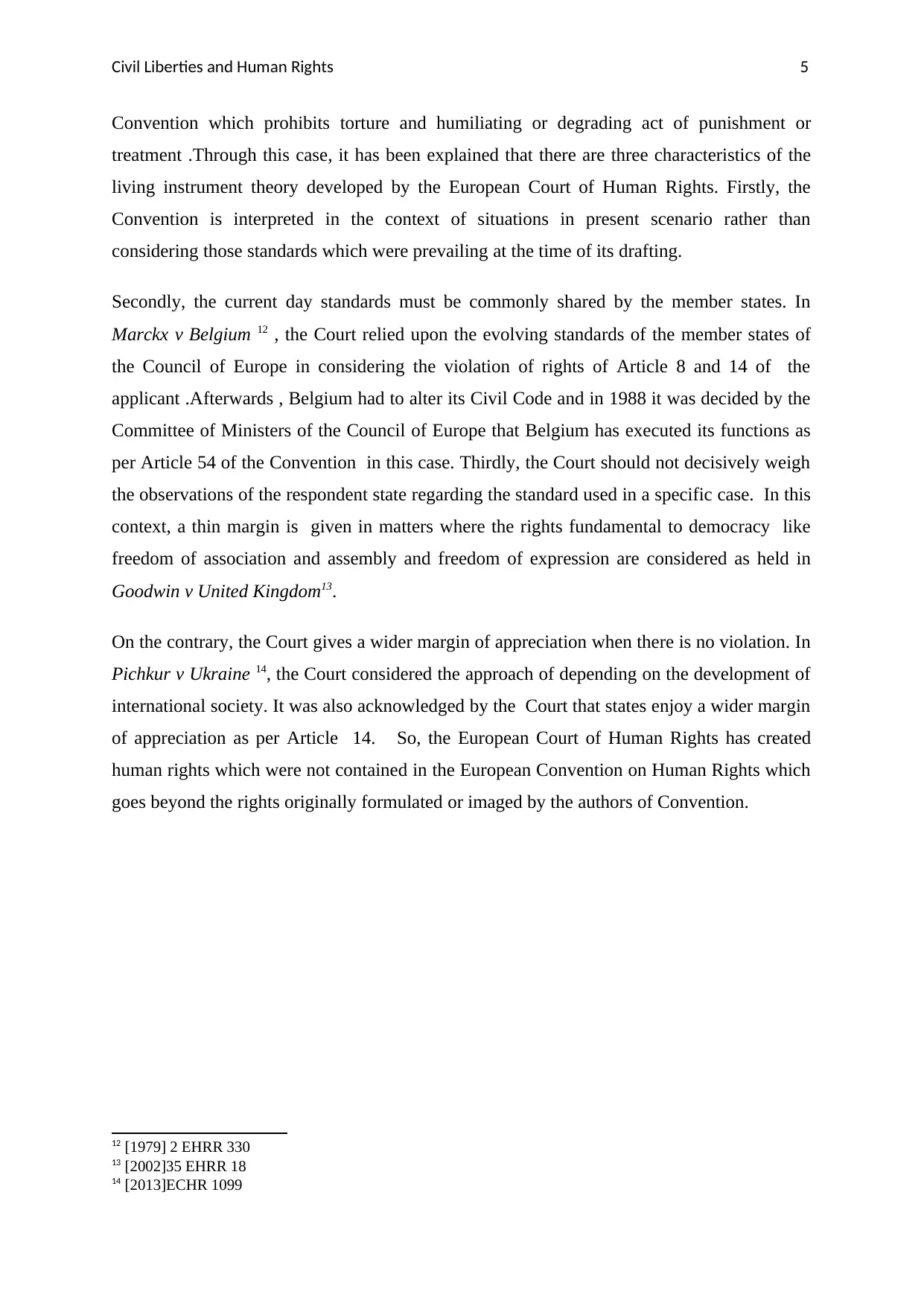
Civil Liberties and Human Rights 5
Convention which prohibits torture and humiliating or degrading act of punishment or
treatment .Through this case, it has been explained that there are three characteristics of the
living instrument theory developed by the European Court of Human Rights. Firstly, the
Convention is interpreted in the context of situations in present scenario rather than
considering those standards which were prevailing at the time of its drafting.
Secondly, the current day standards must be commonly shared by the member states. In
Marckx v Belgium 12 , the Court relied upon the evolving standards of the member states of
the Council of Europe in considering the violation of rights of Article 8 and 14 of the
applicant .Afterwards , Belgium had to alter its Civil Code and in 1988 it was decided by the
Committee of Ministers of the Council of Europe that Belgium has executed its functions as
per Article 54 of the Convention in this case. Thirdly, the Court should not decisively weigh
the observations of the respondent state regarding the standard used in a specific case. In this
context, a thin margin is given in matters where the rights fundamental to democracy like
freedom of association and assembly and freedom of expression are considered as held in
Goodwin v United Kingdom13.
On the contrary, the Court gives a wider margin of appreciation when there is no violation. In
Pichkur v Ukraine 14, the Court considered the approach of depending on the development of
international society. It was also acknowledged by the Court that states enjoy a wider margin
of appreciation as per Article 14. So, the European Court of Human Rights has created
human rights which were not contained in the European Convention on Human Rights which
goes beyond the rights originally formulated or imaged by the authors of Convention.
12 [1979] 2 EHRR 330
13 [2002]35 EHRR 18
14 [2013]ECHR 1099
Convention which prohibits torture and humiliating or degrading act of punishment or
treatment .Through this case, it has been explained that there are three characteristics of the
living instrument theory developed by the European Court of Human Rights. Firstly, the
Convention is interpreted in the context of situations in present scenario rather than
considering those standards which were prevailing at the time of its drafting.
Secondly, the current day standards must be commonly shared by the member states. In
Marckx v Belgium 12 , the Court relied upon the evolving standards of the member states of
the Council of Europe in considering the violation of rights of Article 8 and 14 of the
applicant .Afterwards , Belgium had to alter its Civil Code and in 1988 it was decided by the
Committee of Ministers of the Council of Europe that Belgium has executed its functions as
per Article 54 of the Convention in this case. Thirdly, the Court should not decisively weigh
the observations of the respondent state regarding the standard used in a specific case. In this
context, a thin margin is given in matters where the rights fundamental to democracy like
freedom of association and assembly and freedom of expression are considered as held in
Goodwin v United Kingdom13.
On the contrary, the Court gives a wider margin of appreciation when there is no violation. In
Pichkur v Ukraine 14, the Court considered the approach of depending on the development of
international society. It was also acknowledged by the Court that states enjoy a wider margin
of appreciation as per Article 14. So, the European Court of Human Rights has created
human rights which were not contained in the European Convention on Human Rights which
goes beyond the rights originally formulated or imaged by the authors of Convention.
12 [1979] 2 EHRR 330
13 [2002]35 EHRR 18
14 [2013]ECHR 1099
⊘ This is a preview!⊘
Do you want full access?
Subscribe today to unlock all pages.

Trusted by 1+ million students worldwide
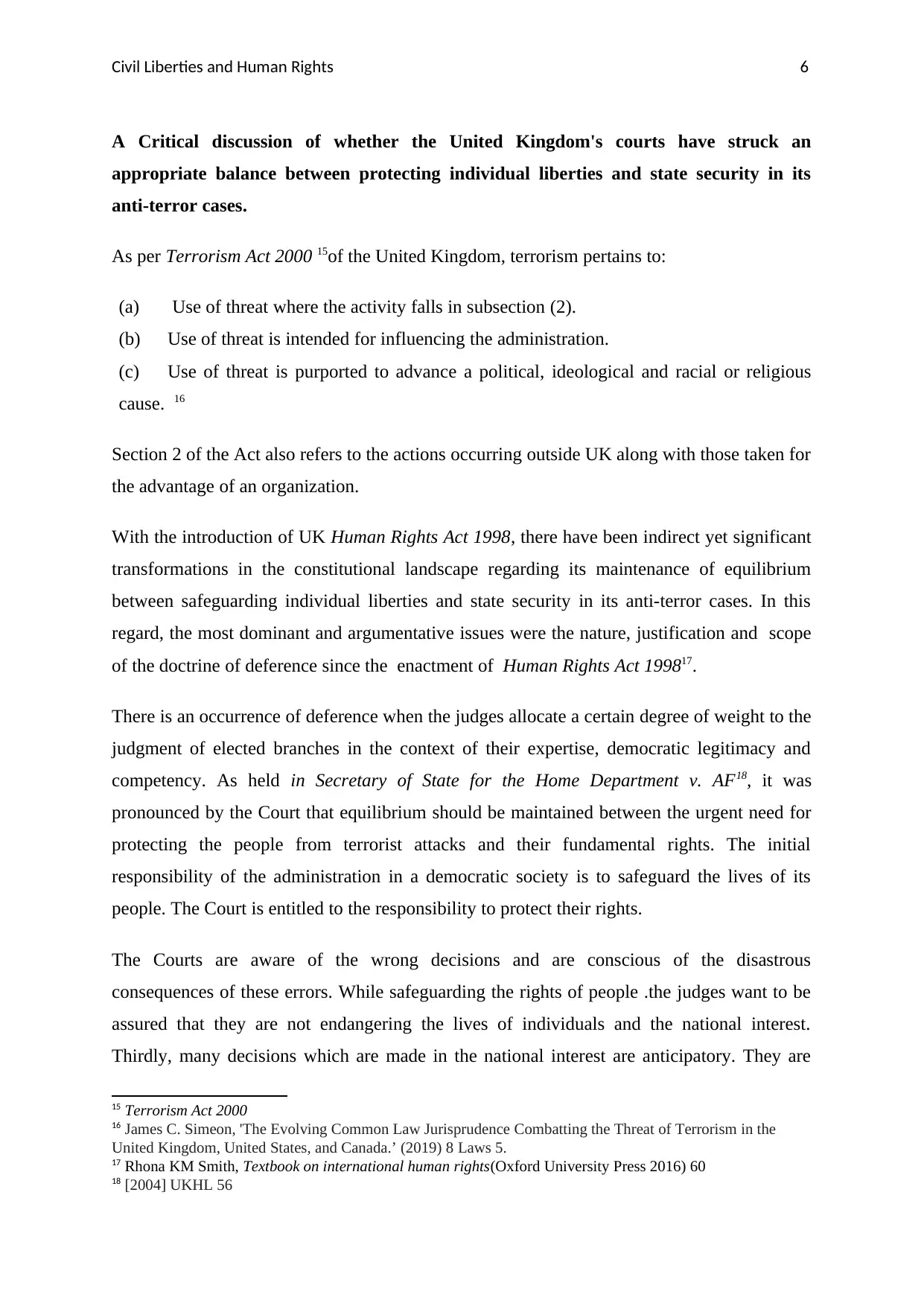
Civil Liberties and Human Rights 6
A Critical discussion of whether the United Kingdom's courts have struck an
appropriate balance between protecting individual liberties and state security in its
anti-terror cases.
As per Terrorism Act 2000 15of the United Kingdom, terrorism pertains to:
(a) Use of threat where the activity falls in subsection (2).
(b) Use of threat is intended for influencing the administration.
(c) Use of threat is purported to advance a political, ideological and racial or religious
cause. 16
Section 2 of the Act also refers to the actions occurring outside UK along with those taken for
the advantage of an organization.
With the introduction of UK Human Rights Act 1998, there have been indirect yet significant
transformations in the constitutional landscape regarding its maintenance of equilibrium
between safeguarding individual liberties and state security in its anti-terror cases. In this
regard, the most dominant and argumentative issues were the nature, justification and scope
of the doctrine of deference since the enactment of Human Rights Act 199817.
There is an occurrence of deference when the judges allocate a certain degree of weight to the
judgment of elected branches in the context of their expertise, democratic legitimacy and
competency. As held in Secretary of State for the Home Department v. AF18, it was
pronounced by the Court that equilibrium should be maintained between the urgent need for
protecting the people from terrorist attacks and their fundamental rights. The initial
responsibility of the administration in a democratic society is to safeguard the lives of its
people. The Court is entitled to the responsibility to protect their rights.
The Courts are aware of the wrong decisions and are conscious of the disastrous
consequences of these errors. While safeguarding the rights of people .the judges want to be
assured that they are not endangering the lives of individuals and the national interest.
Thirdly, many decisions which are made in the national interest are anticipatory. They are
15 Terrorism Act 2000
16 James C. Simeon, 'The Evolving Common Law Jurisprudence Combatting the Threat of Terrorism in the
United Kingdom, United States, and Canada.’ (2019) 8 Laws 5.
17 Rhona KM Smith, Textbook on international human rights(Oxford University Press 2016) 60
18 [2004] UKHL 56
A Critical discussion of whether the United Kingdom's courts have struck an
appropriate balance between protecting individual liberties and state security in its
anti-terror cases.
As per Terrorism Act 2000 15of the United Kingdom, terrorism pertains to:
(a) Use of threat where the activity falls in subsection (2).
(b) Use of threat is intended for influencing the administration.
(c) Use of threat is purported to advance a political, ideological and racial or religious
cause. 16
Section 2 of the Act also refers to the actions occurring outside UK along with those taken for
the advantage of an organization.
With the introduction of UK Human Rights Act 1998, there have been indirect yet significant
transformations in the constitutional landscape regarding its maintenance of equilibrium
between safeguarding individual liberties and state security in its anti-terror cases. In this
regard, the most dominant and argumentative issues were the nature, justification and scope
of the doctrine of deference since the enactment of Human Rights Act 199817.
There is an occurrence of deference when the judges allocate a certain degree of weight to the
judgment of elected branches in the context of their expertise, democratic legitimacy and
competency. As held in Secretary of State for the Home Department v. AF18, it was
pronounced by the Court that equilibrium should be maintained between the urgent need for
protecting the people from terrorist attacks and their fundamental rights. The initial
responsibility of the administration in a democratic society is to safeguard the lives of its
people. The Court is entitled to the responsibility to protect their rights.
The Courts are aware of the wrong decisions and are conscious of the disastrous
consequences of these errors. While safeguarding the rights of people .the judges want to be
assured that they are not endangering the lives of individuals and the national interest.
Thirdly, many decisions which are made in the national interest are anticipatory. They are
15 Terrorism Act 2000
16 James C. Simeon, 'The Evolving Common Law Jurisprudence Combatting the Threat of Terrorism in the
United Kingdom, United States, and Canada.’ (2019) 8 Laws 5.
17 Rhona KM Smith, Textbook on international human rights(Oxford University Press 2016) 60
18 [2004] UKHL 56
Paraphrase This Document
Need a fresh take? Get an instant paraphrase of this document with our AI Paraphraser
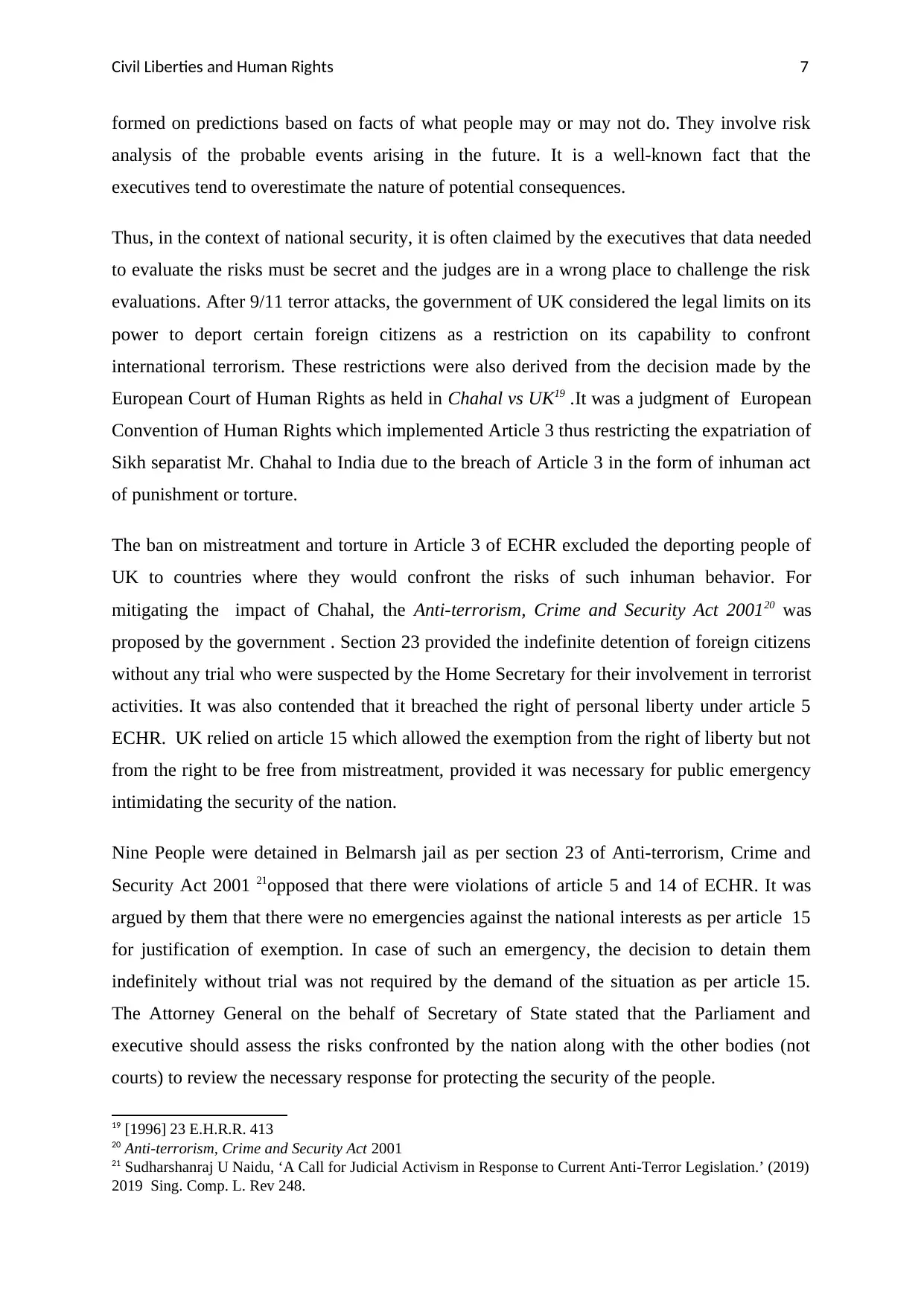
Civil Liberties and Human Rights 7
formed on predictions based on facts of what people may or may not do. They involve risk
analysis of the probable events arising in the future. It is a well-known fact that the
executives tend to overestimate the nature of potential consequences.
Thus, in the context of national security, it is often claimed by the executives that data needed
to evaluate the risks must be secret and the judges are in a wrong place to challenge the risk
evaluations. After 9/11 terror attacks, the government of UK considered the legal limits on its
power to deport certain foreign citizens as a restriction on its capability to confront
international terrorism. These restrictions were also derived from the decision made by the
European Court of Human Rights as held in Chahal vs UK19 .It was a judgment of European
Convention of Human Rights which implemented Article 3 thus restricting the expatriation of
Sikh separatist Mr. Chahal to India due to the breach of Article 3 in the form of inhuman act
of punishment or torture.
The ban on mistreatment and torture in Article 3 of ECHR excluded the deporting people of
UK to countries where they would confront the risks of such inhuman behavior. For
mitigating the impact of Chahal, the Anti-terrorism, Crime and Security Act 200120 was
proposed by the government . Section 23 provided the indefinite detention of foreign citizens
without any trial who were suspected by the Home Secretary for their involvement in terrorist
activities. It was also contended that it breached the right of personal liberty under article 5
ECHR. UK relied on article 15 which allowed the exemption from the right of liberty but not
from the right to be free from mistreatment, provided it was necessary for public emergency
intimidating the security of the nation.
Nine People were detained in Belmarsh jail as per section 23 of Anti-terrorism, Crime and
Security Act 2001 21opposed that there were violations of article 5 and 14 of ECHR. It was
argued by them that there were no emergencies against the national interests as per article 15
for justification of exemption. In case of such an emergency, the decision to detain them
indefinitely without trial was not required by the demand of the situation as per article 15.
The Attorney General on the behalf of Secretary of State stated that the Parliament and
executive should assess the risks confronted by the nation along with the other bodies (not
courts) to review the necessary response for protecting the security of the people.
19 [1996] 23 E.H.R.R. 413
20 Anti-terrorism, Crime and Security Act 2001
21 Sudharshanraj U Naidu, ‘A Call for Judicial Activism in Response to Current Anti-Terror Legislation.’ (2019)
2019 Sing. Comp. L. Rev 248.
formed on predictions based on facts of what people may or may not do. They involve risk
analysis of the probable events arising in the future. It is a well-known fact that the
executives tend to overestimate the nature of potential consequences.
Thus, in the context of national security, it is often claimed by the executives that data needed
to evaluate the risks must be secret and the judges are in a wrong place to challenge the risk
evaluations. After 9/11 terror attacks, the government of UK considered the legal limits on its
power to deport certain foreign citizens as a restriction on its capability to confront
international terrorism. These restrictions were also derived from the decision made by the
European Court of Human Rights as held in Chahal vs UK19 .It was a judgment of European
Convention of Human Rights which implemented Article 3 thus restricting the expatriation of
Sikh separatist Mr. Chahal to India due to the breach of Article 3 in the form of inhuman act
of punishment or torture.
The ban on mistreatment and torture in Article 3 of ECHR excluded the deporting people of
UK to countries where they would confront the risks of such inhuman behavior. For
mitigating the impact of Chahal, the Anti-terrorism, Crime and Security Act 200120 was
proposed by the government . Section 23 provided the indefinite detention of foreign citizens
without any trial who were suspected by the Home Secretary for their involvement in terrorist
activities. It was also contended that it breached the right of personal liberty under article 5
ECHR. UK relied on article 15 which allowed the exemption from the right of liberty but not
from the right to be free from mistreatment, provided it was necessary for public emergency
intimidating the security of the nation.
Nine People were detained in Belmarsh jail as per section 23 of Anti-terrorism, Crime and
Security Act 2001 21opposed that there were violations of article 5 and 14 of ECHR. It was
argued by them that there were no emergencies against the national interests as per article 15
for justification of exemption. In case of such an emergency, the decision to detain them
indefinitely without trial was not required by the demand of the situation as per article 15.
The Attorney General on the behalf of Secretary of State stated that the Parliament and
executive should assess the risks confronted by the nation along with the other bodies (not
courts) to review the necessary response for protecting the security of the people.
19 [1996] 23 E.H.R.R. 413
20 Anti-terrorism, Crime and Security Act 2001
21 Sudharshanraj U Naidu, ‘A Call for Judicial Activism in Response to Current Anti-Terror Legislation.’ (2019)
2019 Sing. Comp. L. Rev 248.
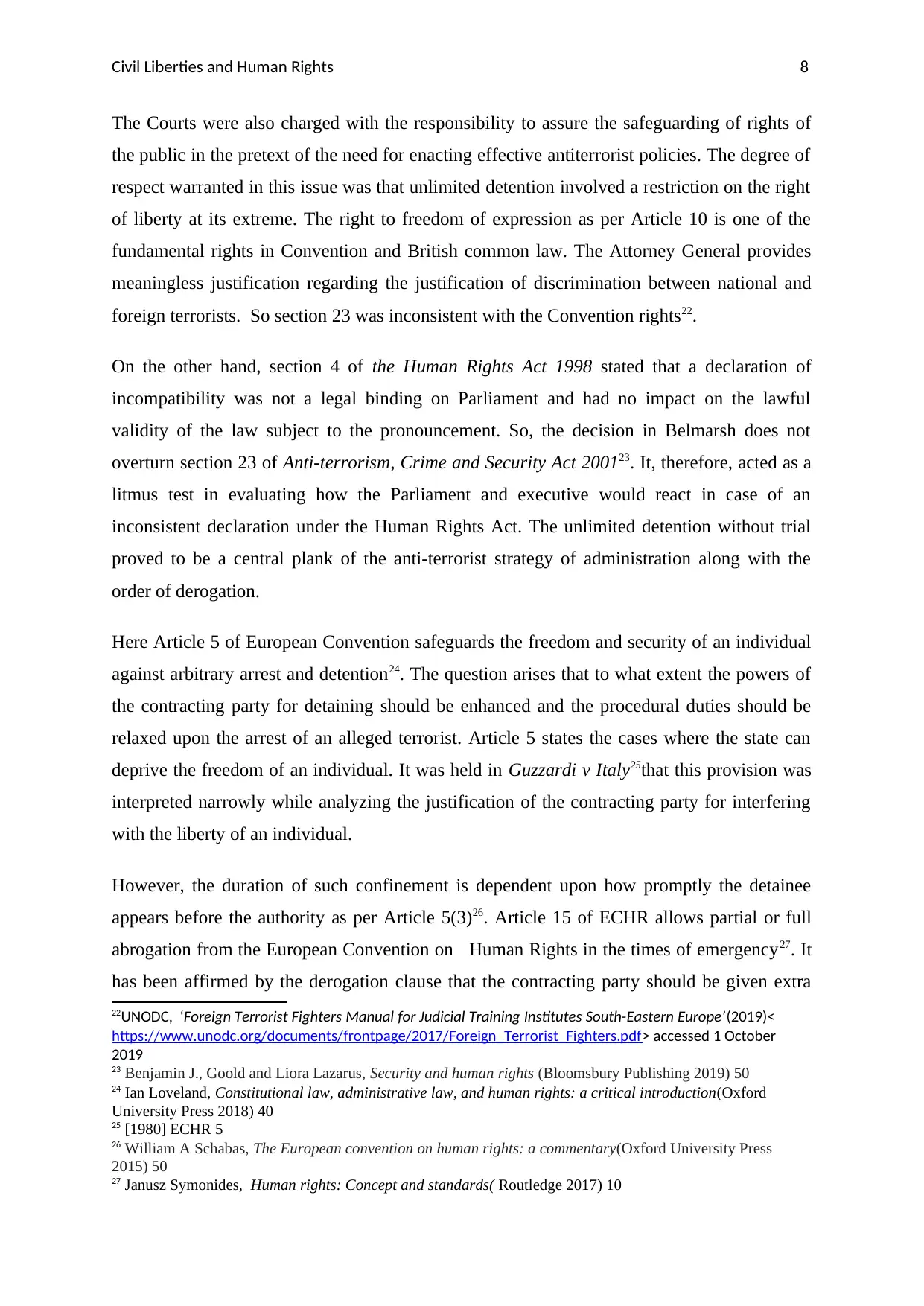
Civil Liberties and Human Rights 8
The Courts were also charged with the responsibility to assure the safeguarding of rights of
the public in the pretext of the need for enacting effective antiterrorist policies. The degree of
respect warranted in this issue was that unlimited detention involved a restriction on the right
of liberty at its extreme. The right to freedom of expression as per Article 10 is one of the
fundamental rights in Convention and British common law. The Attorney General provides
meaningless justification regarding the justification of discrimination between national and
foreign terrorists. So section 23 was inconsistent with the Convention rights22.
On the other hand, section 4 of the Human Rights Act 1998 stated that a declaration of
incompatibility was not a legal binding on Parliament and had no impact on the lawful
validity of the law subject to the pronouncement. So, the decision in Belmarsh does not
overturn section 23 of Anti-terrorism, Crime and Security Act 200123. It, therefore, acted as a
litmus test in evaluating how the Parliament and executive would react in case of an
inconsistent declaration under the Human Rights Act. The unlimited detention without trial
proved to be a central plank of the anti-terrorist strategy of administration along with the
order of derogation.
Here Article 5 of European Convention safeguards the freedom and security of an individual
against arbitrary arrest and detention24. The question arises that to what extent the powers of
the contracting party for detaining should be enhanced and the procedural duties should be
relaxed upon the arrest of an alleged terrorist. Article 5 states the cases where the state can
deprive the freedom of an individual. It was held in Guzzardi v Italy25that this provision was
interpreted narrowly while analyzing the justification of the contracting party for interfering
with the liberty of an individual.
However, the duration of such confinement is dependent upon how promptly the detainee
appears before the authority as per Article 5(3)26. Article 15 of ECHR allows partial or full
abrogation from the European Convention on Human Rights in the times of emergency27. It
has been affirmed by the derogation clause that the contracting party should be given extra
22UNODC, ‘Foreign Terrorist Fighters Manual for Judicial Training Institutes South-Eastern Europe’(2019)<
https://www.unodc.org/documents/frontpage/2017/Foreign_Terrorist_Fighters.pdf> accessed 1 October
2019
23 Benjamin J., Goold and Liora Lazarus, Security and human rights (Bloomsbury Publishing 2019) 50
24 Ian Loveland, Constitutional law, administrative law, and human rights: a critical introduction(Oxford
University Press 2018) 40
25 [1980] ECHR 5
26 William A Schabas, The European convention on human rights: a commentary(Oxford University Press
2015) 50
27 Janusz Symonides, Human rights: Concept and standards( Routledge 2017) 10
The Courts were also charged with the responsibility to assure the safeguarding of rights of
the public in the pretext of the need for enacting effective antiterrorist policies. The degree of
respect warranted in this issue was that unlimited detention involved a restriction on the right
of liberty at its extreme. The right to freedom of expression as per Article 10 is one of the
fundamental rights in Convention and British common law. The Attorney General provides
meaningless justification regarding the justification of discrimination between national and
foreign terrorists. So section 23 was inconsistent with the Convention rights22.
On the other hand, section 4 of the Human Rights Act 1998 stated that a declaration of
incompatibility was not a legal binding on Parliament and had no impact on the lawful
validity of the law subject to the pronouncement. So, the decision in Belmarsh does not
overturn section 23 of Anti-terrorism, Crime and Security Act 200123. It, therefore, acted as a
litmus test in evaluating how the Parliament and executive would react in case of an
inconsistent declaration under the Human Rights Act. The unlimited detention without trial
proved to be a central plank of the anti-terrorist strategy of administration along with the
order of derogation.
Here Article 5 of European Convention safeguards the freedom and security of an individual
against arbitrary arrest and detention24. The question arises that to what extent the powers of
the contracting party for detaining should be enhanced and the procedural duties should be
relaxed upon the arrest of an alleged terrorist. Article 5 states the cases where the state can
deprive the freedom of an individual. It was held in Guzzardi v Italy25that this provision was
interpreted narrowly while analyzing the justification of the contracting party for interfering
with the liberty of an individual.
However, the duration of such confinement is dependent upon how promptly the detainee
appears before the authority as per Article 5(3)26. Article 15 of ECHR allows partial or full
abrogation from the European Convention on Human Rights in the times of emergency27. It
has been affirmed by the derogation clause that the contracting party should be given extra
22UNODC, ‘Foreign Terrorist Fighters Manual for Judicial Training Institutes South-Eastern Europe’(2019)<
https://www.unodc.org/documents/frontpage/2017/Foreign_Terrorist_Fighters.pdf> accessed 1 October
2019
23 Benjamin J., Goold and Liora Lazarus, Security and human rights (Bloomsbury Publishing 2019) 50
24 Ian Loveland, Constitutional law, administrative law, and human rights: a critical introduction(Oxford
University Press 2018) 40
25 [1980] ECHR 5
26 William A Schabas, The European convention on human rights: a commentary(Oxford University Press
2015) 50
27 Janusz Symonides, Human rights: Concept and standards( Routledge 2017) 10
⊘ This is a preview!⊘
Do you want full access?
Subscribe today to unlock all pages.

Trusted by 1+ million students worldwide
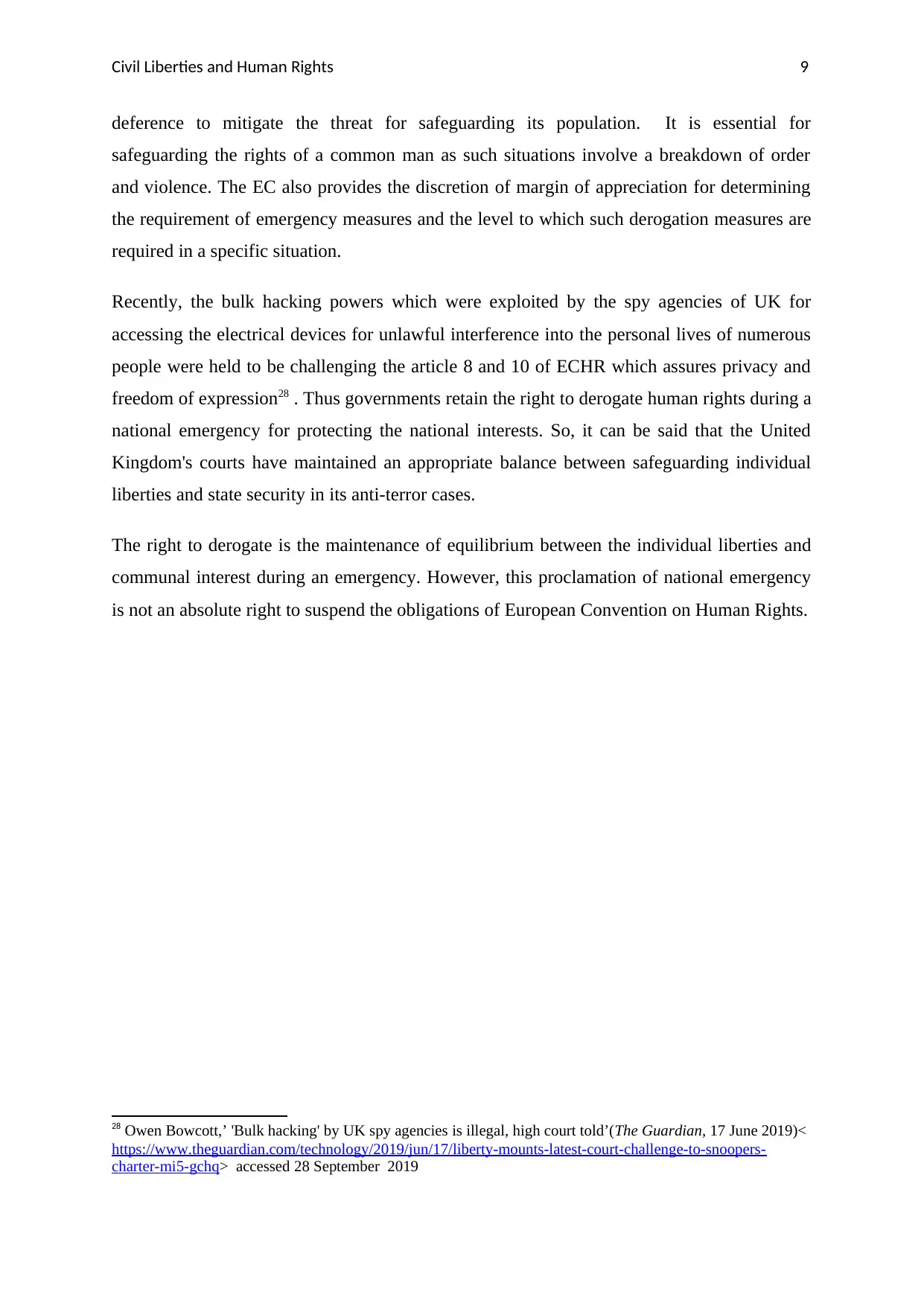
Civil Liberties and Human Rights 9
deference to mitigate the threat for safeguarding its population. It is essential for
safeguarding the rights of a common man as such situations involve a breakdown of order
and violence. The EC also provides the discretion of margin of appreciation for determining
the requirement of emergency measures and the level to which such derogation measures are
required in a specific situation.
Recently, the bulk hacking powers which were exploited by the spy agencies of UK for
accessing the electrical devices for unlawful interference into the personal lives of numerous
people were held to be challenging the article 8 and 10 of ECHR which assures privacy and
freedom of expression28 . Thus governments retain the right to derogate human rights during a
national emergency for protecting the national interests. So, it can be said that the United
Kingdom's courts have maintained an appropriate balance between safeguarding individual
liberties and state security in its anti-terror cases.
The right to derogate is the maintenance of equilibrium between the individual liberties and
communal interest during an emergency. However, this proclamation of national emergency
is not an absolute right to suspend the obligations of European Convention on Human Rights.
28 Owen Bowcott,’ 'Bulk hacking' by UK spy agencies is illegal, high court told’(The Guardian, 17 June 2019)<
https://www.theguardian.com/technology/2019/jun/17/liberty-mounts-latest-court-challenge-to-snoopers-
charter-mi5-gchq> accessed 28 September 2019
deference to mitigate the threat for safeguarding its population. It is essential for
safeguarding the rights of a common man as such situations involve a breakdown of order
and violence. The EC also provides the discretion of margin of appreciation for determining
the requirement of emergency measures and the level to which such derogation measures are
required in a specific situation.
Recently, the bulk hacking powers which were exploited by the spy agencies of UK for
accessing the electrical devices for unlawful interference into the personal lives of numerous
people were held to be challenging the article 8 and 10 of ECHR which assures privacy and
freedom of expression28 . Thus governments retain the right to derogate human rights during a
national emergency for protecting the national interests. So, it can be said that the United
Kingdom's courts have maintained an appropriate balance between safeguarding individual
liberties and state security in its anti-terror cases.
The right to derogate is the maintenance of equilibrium between the individual liberties and
communal interest during an emergency. However, this proclamation of national emergency
is not an absolute right to suspend the obligations of European Convention on Human Rights.
28 Owen Bowcott,’ 'Bulk hacking' by UK spy agencies is illegal, high court told’(The Guardian, 17 June 2019)<
https://www.theguardian.com/technology/2019/jun/17/liberty-mounts-latest-court-challenge-to-snoopers-
charter-mi5-gchq> accessed 28 September 2019
Paraphrase This Document
Need a fresh take? Get an instant paraphrase of this document with our AI Paraphraser
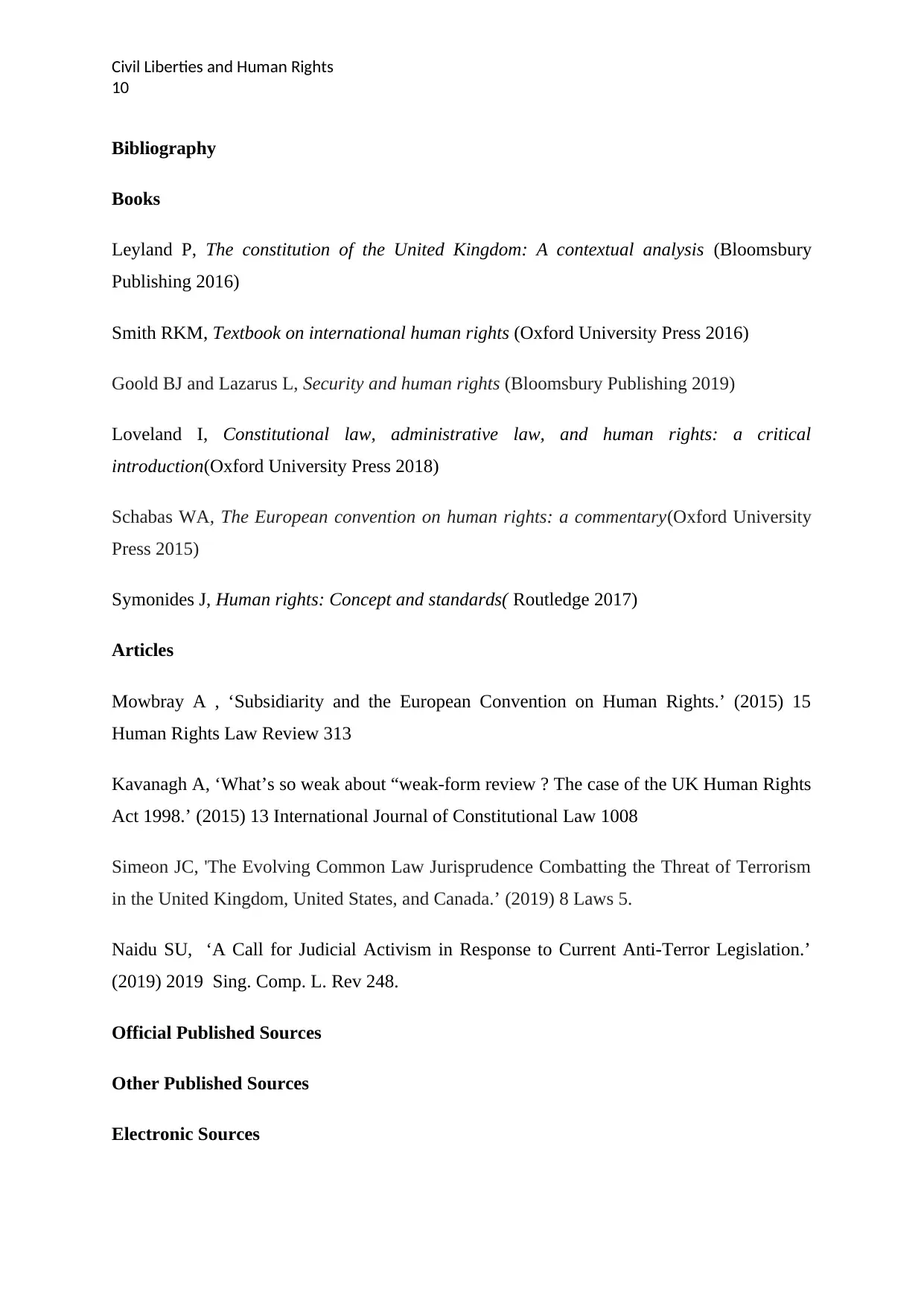
Civil Liberties and Human Rights
10
Bibliography
Books
Leyland P, The constitution of the United Kingdom: A contextual analysis (Bloomsbury
Publishing 2016)
Smith RKM, Textbook on international human rights (Oxford University Press 2016)
Goold BJ and Lazarus L, Security and human rights (Bloomsbury Publishing 2019)
Loveland I, Constitutional law, administrative law, and human rights: a critical
introduction(Oxford University Press 2018)
Schabas WA, The European convention on human rights: a commentary(Oxford University
Press 2015)
Symonides J, Human rights: Concept and standards( Routledge 2017)
Articles
Mowbray A , ‘Subsidiarity and the European Convention on Human Rights.’ (2015) 15
Human Rights Law Review 313
Kavanagh A, ‘What’s so weak about “weak-form review ? The case of the UK Human Rights
Act 1998.’ (2015) 13 International Journal of Constitutional Law 1008
Simeon JC, 'The Evolving Common Law Jurisprudence Combatting the Threat of Terrorism
in the United Kingdom, United States, and Canada.’ (2019) 8 Laws 5.
Naidu SU, ‘A Call for Judicial Activism in Response to Current Anti-Terror Legislation.’
(2019) 2019 Sing. Comp. L. Rev 248.
Official Published Sources
Other Published Sources
Electronic Sources
10
Bibliography
Books
Leyland P, The constitution of the United Kingdom: A contextual analysis (Bloomsbury
Publishing 2016)
Smith RKM, Textbook on international human rights (Oxford University Press 2016)
Goold BJ and Lazarus L, Security and human rights (Bloomsbury Publishing 2019)
Loveland I, Constitutional law, administrative law, and human rights: a critical
introduction(Oxford University Press 2018)
Schabas WA, The European convention on human rights: a commentary(Oxford University
Press 2015)
Symonides J, Human rights: Concept and standards( Routledge 2017)
Articles
Mowbray A , ‘Subsidiarity and the European Convention on Human Rights.’ (2015) 15
Human Rights Law Review 313
Kavanagh A, ‘What’s so weak about “weak-form review ? The case of the UK Human Rights
Act 1998.’ (2015) 13 International Journal of Constitutional Law 1008
Simeon JC, 'The Evolving Common Law Jurisprudence Combatting the Threat of Terrorism
in the United Kingdom, United States, and Canada.’ (2019) 8 Laws 5.
Naidu SU, ‘A Call for Judicial Activism in Response to Current Anti-Terror Legislation.’
(2019) 2019 Sing. Comp. L. Rev 248.
Official Published Sources
Other Published Sources
Electronic Sources
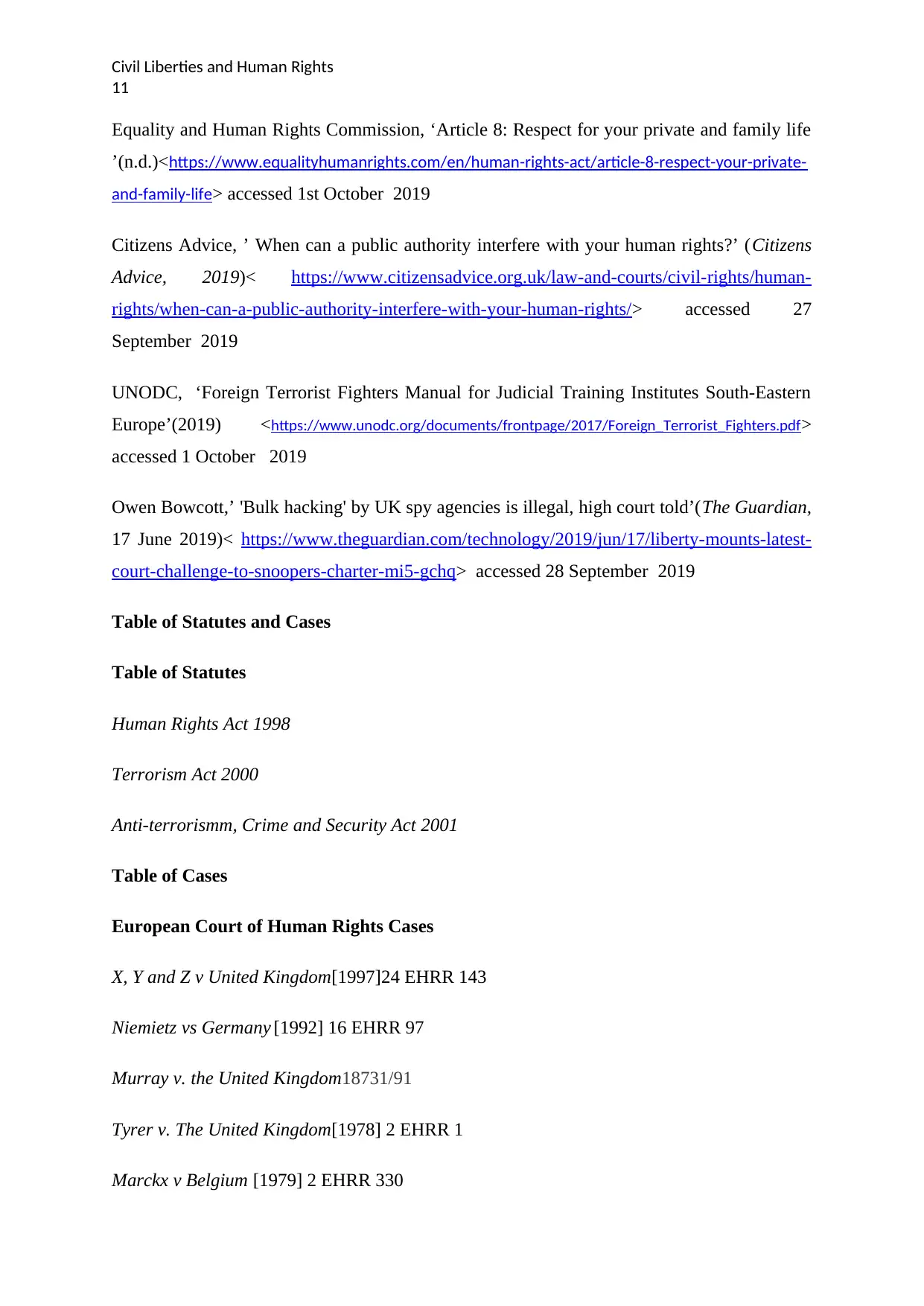
Civil Liberties and Human Rights
11
Equality and Human Rights Commission, ‘Article 8: Respect for your private and family life
’(n.d.)<https://www.equalityhumanrights.com/en/human-rights-act/article-8-respect-your-private-
and-family-life> accessed 1st October 2019
Citizens Advice, ’ When can a public authority interfere with your human rights?’ (Citizens
Advice, 2019)< https://www.citizensadvice.org.uk/law-and-courts/civil-rights/human-
rights/when-can-a-public-authority-interfere-with-your-human-rights/> accessed 27
September 2019
UNODC, ‘Foreign Terrorist Fighters Manual for Judicial Training Institutes South-Eastern
Europe’(2019) <https://www.unodc.org/documents/frontpage/2017/Foreign_Terrorist_Fighters.pdf>
accessed 1 October 2019
Owen Bowcott,’ 'Bulk hacking' by UK spy agencies is illegal, high court told’(The Guardian,
17 June 2019)< https://www.theguardian.com/technology/2019/jun/17/liberty-mounts-latest-
court-challenge-to-snoopers-charter-mi5-gchq> accessed 28 September 2019
Table of Statutes and Cases
Table of Statutes
Human Rights Act 1998
Terrorism Act 2000
Anti-terrorismm, Crime and Security Act 2001
Table of Cases
European Court of Human Rights Cases
X, Y and Z v United Kingdom[1997]24 EHRR 143
Niemietz vs Germany [1992] 16 EHRR 97
Murray v. the United Kingdom18731/91
Tyrer v. The United Kingdom[1978] 2 EHRR 1
Marckx v Belgium [1979] 2 EHRR 330
11
Equality and Human Rights Commission, ‘Article 8: Respect for your private and family life
’(n.d.)<https://www.equalityhumanrights.com/en/human-rights-act/article-8-respect-your-private-
and-family-life> accessed 1st October 2019
Citizens Advice, ’ When can a public authority interfere with your human rights?’ (Citizens
Advice, 2019)< https://www.citizensadvice.org.uk/law-and-courts/civil-rights/human-
rights/when-can-a-public-authority-interfere-with-your-human-rights/> accessed 27
September 2019
UNODC, ‘Foreign Terrorist Fighters Manual for Judicial Training Institutes South-Eastern
Europe’(2019) <https://www.unodc.org/documents/frontpage/2017/Foreign_Terrorist_Fighters.pdf>
accessed 1 October 2019
Owen Bowcott,’ 'Bulk hacking' by UK spy agencies is illegal, high court told’(The Guardian,
17 June 2019)< https://www.theguardian.com/technology/2019/jun/17/liberty-mounts-latest-
court-challenge-to-snoopers-charter-mi5-gchq> accessed 28 September 2019
Table of Statutes and Cases
Table of Statutes
Human Rights Act 1998
Terrorism Act 2000
Anti-terrorismm, Crime and Security Act 2001
Table of Cases
European Court of Human Rights Cases
X, Y and Z v United Kingdom[1997]24 EHRR 143
Niemietz vs Germany [1992] 16 EHRR 97
Murray v. the United Kingdom18731/91
Tyrer v. The United Kingdom[1978] 2 EHRR 1
Marckx v Belgium [1979] 2 EHRR 330
⊘ This is a preview!⊘
Do you want full access?
Subscribe today to unlock all pages.

Trusted by 1+ million students worldwide
1 out of 13
Related Documents
Your All-in-One AI-Powered Toolkit for Academic Success.
+13062052269
info@desklib.com
Available 24*7 on WhatsApp / Email
![[object Object]](/_next/static/media/star-bottom.7253800d.svg)
Unlock your academic potential
Copyright © 2020–2026 A2Z Services. All Rights Reserved. Developed and managed by ZUCOL.





